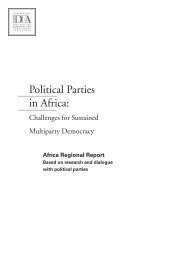Background Document - Danish Institute for Parties and Democracy
Background Document - Danish Institute for Parties and Democracy
Background Document - Danish Institute for Parties and Democracy
You also want an ePaper? Increase the reach of your titles
YUMPU automatically turns print PDFs into web optimized ePapers that Google loves.
amidst a scenario where only 0.6% were mayors, 1.81% members of provincial councils,<br />
<strong>and</strong> 2.42% are members of municipal councils. The role of the media as a key opinion<br />
maker <strong>and</strong> its role in increasing awareness on this issue were reiterated. 12<br />
In India in the year 1995 a civil society organisation called Society <strong>for</strong> Participatory<br />
research in Asia launched an ambitious <strong>and</strong> massive civil society campaign ahead<br />
of the elections to institutions of local self government in the rural areas elections<br />
(popularly known as panchayat polls in India). Called Pre Election Voters Awareness<br />
Campaign it involved three important players, namely civil society coalitions, state<br />
election commissions <strong>and</strong> the media <strong>and</strong> one of its primary purposes was to launch a<br />
special drive to ensure participation of women both as voters <strong>and</strong> c<strong>and</strong>idates.<br />
Thus began a process of politicization of women <strong>for</strong> local elections regardless of<br />
whether they actually contested the local elections or not. Through this campaign<br />
some of them emerged as animators, others as engaged voters. Women c<strong>and</strong>idates<br />
who chose to contest the local elections were supported not only in the constituencies<br />
reserved <strong>for</strong> women but also from unreserved constituencies to drive home the<br />
fact that women need not restrict their political aspirations to reserved constituencies<br />
only.<br />
STRATEGIES FOR CHANGES AND RECOMMENDATIONS<br />
While specific strategies to increase meaningful participation by women in politics<br />
can be context specific, drawing up some broad generalizations <strong>and</strong> guidelines are<br />
possible. 13<br />
´ The first of these operate at the systemic level. A quota of reserved seats <strong>for</strong> women in<br />
countries where few women have been elected filled with direct open elections with the<br />
same status as general seats work better than any <strong>for</strong>m of nomination with its associated<br />
culture of patronage. A proportional system of representation <strong>and</strong> ward system<br />
appear to work better <strong>for</strong> women. It is also important that local elected representatives<br />
should be paid at a level that will allow women to participate. Funding <strong>for</strong> gender <strong>and</strong><br />
development that emphasizes capacity building, networking <strong>and</strong> advocacy <strong>and</strong> finally<br />
recruitment by political parties of women are important steps that can be taken in this<br />
direction.<br />
´ Systemic changes need to be backed by attitudinal changes – the culture of local government<br />
needs to change to ensure that women are treated fairly <strong>and</strong> <strong>for</strong> this gender<br />
awareness programmes <strong>for</strong> both men <strong>and</strong> women need to be developed. Local government<br />
needs to be more women friendly <strong>and</strong> consensus style politics <strong>and</strong> meetings at<br />
times that fit into other responsibilities that women have will create a more enabling<br />
environment <strong>for</strong> women in local politics. Most importantly opportunities need to be<br />
made <strong>for</strong> women to underst<strong>and</strong> their roles <strong>and</strong> functions as soon as they are elected.<br />
´ The third set of strategies is meant to increase the number of women in politics <strong>and</strong> change<br />
their subordinate status. Policies on economic <strong>and</strong> social empowerment are needed to<br />
enable women to participate on an equal footing with men. Local government needs to<br />
work closely with NGOs civil society <strong>and</strong> women’s groups to develop communities <strong>and</strong><br />
services that take care of women’s needs. Women will be able to enter local politics only<br />
if they find financial support, childcare support <strong>and</strong> training opportunities <strong>and</strong> women’s<br />
associations <strong>for</strong> women councilors need to provide a voice <strong>for</strong> women’s views <strong>and</strong> networking.<br />
Funds need to be established to assist women to st<strong>and</strong> <strong>for</strong> election <strong>and</strong> gender<br />
disaggregated data needs to be built to increase visibility of women.<br />
12 http://www.undp.org.tr/Gozlem2.aspx?WebSayfaNo=1571<br />
13 Comparative Study of Women in Local Government in Asia <strong>and</strong> the Pacific, p. 8-19.<br />
WOMEN IN POLITICS DANISH INSTITUTE FOR PARTIES AND DEMOCRACY PAGE 33
















